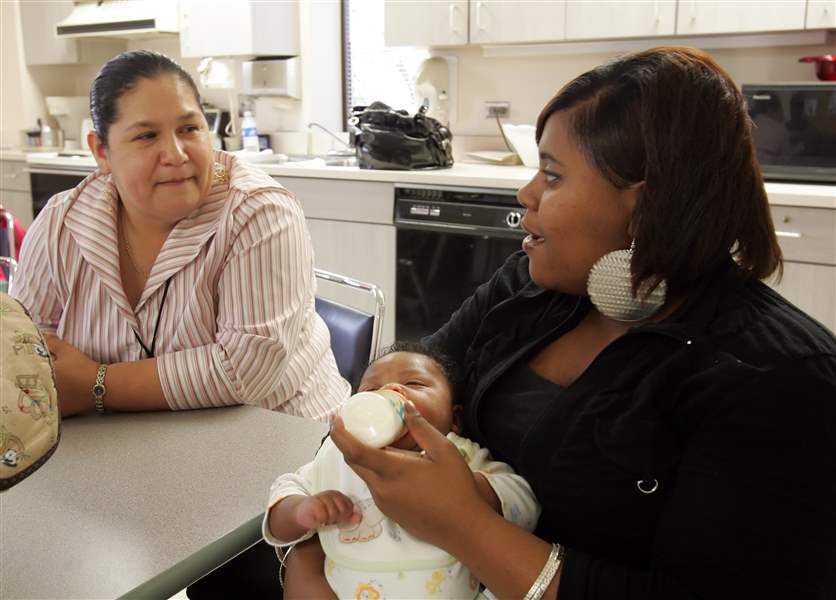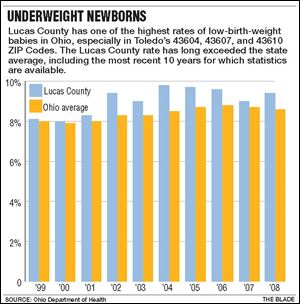
Low birth weight afflicts 3 city of Toledo zones
4/26/2010
Dina Ramirez, left, of Mercy St. Vincent Medical Center helps Kelia Harris, 20, with Ms. Harris' 7-week-old son, Josiah Posey. A first-time mom, Ms. Harris received prenatal support through Pathways.
Jetta Fraser
Kelia Harris wasn't ready to be a mother.
Not only did Ms. Harris lack health insurance when she learned she was pregnant, but the single 20-year-old Toledo woman was overwhelmed by doctor appointments and other preparations. She didn't know what needed to be done to help increase the likelihood of having and raising a healthy child before her son, Josiah Posey, was born eight weeks ago.
"I really didn't know where to go," she recently recalled. "It was my first baby, and I was scared."
But as a pregnant resident of Toledo's 43607 ZIP Code - one of three areas with a high percentage of newborns weighing less than 5 1/2 pounds - Ms. Harris received help from a Mercy St. Vincent Medical Center care coordinator involved in a Lucas County effort called Pathways.
The initiative involving Mercy, Neighborhood Health Association, and other providers is working to get prenatal care to needy pregnant women in and near central Toledo in hopes of preventing infant health problems and even death.
Since the initiative started about 2 1/2 years ago, nearly 550 women have been helped by the program that is coordinated by the Hospital Council of Northwest Ohio and focuses on the 43604, 43607, and 43610 ZIP Codes. At first the goal was to help 100 women annually with medical care, social services, and other needs, but interest has been so great that enrollment had to be suspended for several months last year because of a lack of funds, and other ZIP Codes were dropped all together.
"We are reaching out to homeless shelters and other places," Jan Ruma, hospital council vice president, said. "If it weren't for the outreach, they may not have any care."
Updated statistics about underweight babies in the program's three primary ZIP Codes have not been compiled, but four-year annualized data from 2006 show the low-birth-weight rate among the trio was 13.7 percent. That mirrored the rate for underweight newborns in Cambodia, Nigeria, Uganda, and other developing countries, and it was more than double the U.S. rate.

"It just amazes me that we have a Third World country right down the street," Ms. Ruma said. "Going to the doctor is not relevant. They're just trying to survive."
Adequate prenatal care is a key issue as the United States works to reform health care. The nation's health-care budget has almost tripled in the last decade, although impoverished residents are less likely to connect to primary and preventive treatment, including prenatal care, noted Dr. Mark Redding, a Mansfield, Ohio, pediatrician who helped initiate a Richland County program after which Pathways was modeled.
"The intent is connect to the people who need it the most," Dr. Redding said.
Babies born premature or underweight for other reasons will rack up $52,000 in medical bills in their first year, said Pathways evaluator James Price, public health professor at the University of Toledo.
Ohio's rate of underweight babies was 8.6 percent in 2008, while Lucas County's overall rate was 9.4 percent, the 13th-highest in Ohio, the most recent statistics from the Ohio Department of Health show.
Dina Ramirez, the Pathways care coordinator at Mercy, went with Ms. Harris to prenatal doctor visits and cleared up anything Ms. Harris found unclear. Ms. Ramirez also visited Ms. Harris at the duplex where she lived with a cousin, and remains close with the young woman even though she moved back in with her mother, Sherina Harris, after Josiah was born.
"[Ms. Ramirez] was there when I had the baby," Ms. Harris said.
Recently, Ms. Ramirez answered Ms. Harris' questions about Josiah's first vaccination shots. Josiah weighed 7 pounds, 9 ounces when he was born, and Ms. Ramirez will follow the thriving infant and Ms. Harris for a year.
"When they give the shots, you're going to cry, but it's OK," Ms. Ramirez assured the young mother. "I think every mother goes through that."
Funded primarily by the Toledo Community and Stranahan foundations through this year, the $300,000-a-year program also connects pregnant women with transportation for visits to doctors visits, health insurance coverage, suitable housing, and social services if any are needed.
The hospital council is working to secure funding from Medicaid managed-care insurance plans and other sources to continue the program past this year, Ms. Ruma said.
Mercy, Neighborhood Health Association, and other providers coordinating efforts are paid for specific tasks, such as $50 to give a woman safety education and in-home assessment. Women also are given rewards, such as a smoke alarm and a $20 gift card after participating in the initial safety coaching.
Neighborhood Health Association is noting an improvement in newborn health among targeted mothers, who primarily are African-American and Hispanic women ranging in age from 14 to 44, said Michelle Smith, supervisor of perinatal outreach services.
Problems with substance abuse, domestic violence, and understanding English are some barriers to adequate prenatal care that Pathways helps the women hurdle, Ms. Smith said. For unexplained reasons, African-American women are especially vulnerable to having low-birth-weight babies, no matter what their socioeconomic status, Ms. Smith noted.
"If we decrease stress on mom, we decrease stress on baby," Ms. Smith said. "Baby's able to gain weight, and we have a healthy baby."
Christy Colony, clinical supervisor of the program overseeing Pathways at Toledo Children's Hospital, said she also has seen an improvement in newborn health. "It's really been very helpful," she said.
Celeste Smith, Pathways program coordinator at Mercy, concurred. Ms. Ramirez, whose first language is Spanish, has been able to help many women who otherwise would not have received adequate prenatal care, Mrs. Smith said.
Ms. Ramirez works full-time on Pathways and is following about 40 women, many of whom have her personal cell phone number and call her for guidance. She also helps the women and their families get food, shelter, clothing, furniture, schooling, and whatever else they need.
"A lot of them just have Dina, so they'll give her a call at 2 o'clock in the morning," Mrs. Smith said. "They use Dina 24/7."
She added: "We think we're making a difference, and I see the impact that Dina makes."
Contact Julie M. McKinnon at:
jmckinnon@theblade.com
or 419-724-6087.